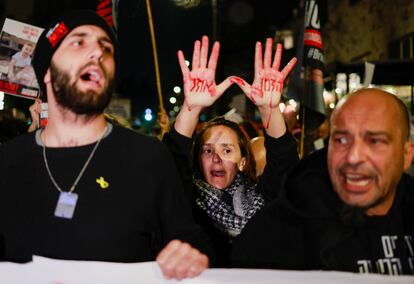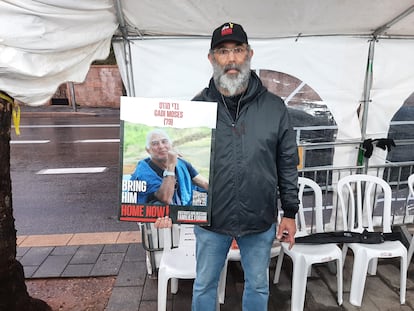Israel weighs Gaza ceasefire amid pressure from hostages’ families
Relatives of more than a hundred Israeli captives have been camping in front of the prime minister’s residence. Hamas is demanding an army withdrawal before negotiating their release. Meanwhile, the bombings are killing people in the south of the Palestinian enclave


Israel’s dual objective of defeating Hamas for good and freeing the Israeli hostages has run up against the harsh reality of the conflict in Gaza, where — after more than 100 days — there is still no sign of the “total military victory” vowed by Israeli Prime Minister Benjamin Netanyahu. Gadi Eisenkot, the former head of the Israeli Defense Forces (IDF), who is a member of the government’s emergency war Cabinet and whose son died last month fighting in Gaza, warned that only negotiation, after ending the hostilities, will secure the release of the hostages.
In this climate of uncertainty, the relatives of the more than a hundred captives in Gaza have redoubled their efforts to demand the government prioritize the release of the hostages over the other objectives of the war. To make their pleas heard, the family members have camped outside Netanyahu’s private residences in Jerusalem and on the Mediterranean coast. On Monday, Netanyahu received representatives of the Hostages and Missing Persons Families Forum, and announced that he was considering a hostage agreement, without offering them more details.
Sources cited by the Reuters agency said Wednesday that Israel and Hamas have made progress to establish a 30-day ceasefire, after several weeks of negotiations through Egyptian and Qatari mediators. A spokesperson for the Israeli government later denied this rapprochement, while the Palestinian Islamist organization remained silent. The exchange of ceasefire proposals has been nonstop in recent days, in a supposed exercise of negotiation bargaining.
Egypt’s military intelligence services revealed on Tuesday an Israeli ceasefire plan of up to 60 days to exchange hostages for Palestinian prisoners in Israeli jails in several phases. Hamas rejected this plan, as the group will not agree to any deal until Israel commits to ending the war and withdrawing from the Gaza Strip. Netanyahu also opposed another offer from Hamas on Monday: a 90-day ceasefire and a gradual exchange of hostages for prisoners.
“The important thing is that Netanyahu has received a delegation from the hostages’ families, which has not been common during the war, and that there are signs that a possible agreement is being negotiated. We are attending the first phases of the talks, as happened before in November, when more than a hundred hostages were released,” Yair Moses, a 52-year-old computer engineer, explained on Tuesday night, in the temporary camp set up in Jerusalem in front of the prime minister’s residence. “I hope this time everything works out,” he said, in reference to the failures of previous initiatives mediated by Qatar and Egypt, coordinated with Israel through the United States.

Dozens of family members and volunteers were busy preparing a large tent as a meeting room and collective kitchen, while Moses held a poster with the image of his father, Gadi Moses, 79, who was kidnapped on October 7 from Kibbutz Nir Oz, a collective farm in the area bordering Gaza. “I trust that he will be one of the first to be released, given his age,” he said. Moses has received no news of his father since December 14, when he was shown a proof-of-life video released by the Islamic Jihad in Gaza. “We believe that getting him and the rest of the hostages back home should be the absolute priority, since the people of Israel are with us,” he said.
While Israel debated a ceasefire, the war in Gaza continued to escalate, with the south hit by the largest offensive in a month. The director of the U.N. agency for Palestinian refugees (UNRWA) in Gaza, Thomas White, reported that at least nine people were killed and another 75 injured when Israel attacked a UNRWA center in Khan Yunis, where hundreds of people displaced by the war were taking refuge. “Two tank rounds hit a building that shelters 800 people,” White said in a message on X, warning of “mass casualties.”
Civilian evacuation order
The Israeli army continued to bomb the main city in southern Gaza, and ordered the evacuation of some areas, where it believes Hamas leaders are hiding. As of Wednesday, the Gaza Ministry of Health had recorded 210 deaths in the last 24 hours, bringing the total death toll to 25,700. Israeli forces also cut off access to the main hospitals in the area and closed the main route for displaced Gazans to reach Rafah, on the border with Egypt.
According to the U.N., the Israeli army ordered the evacuation of several sectors of Khan Yunis, where some 88,000 inhabitants live and some 425,000 displaced people have settled. This is also where the main health centers are still operational. A military spokesperson said Wednesday that the Israeli army has demolished 1,100 buildings of the 2,800 buildings it plans to tear down on the outskirts of Gaza. Israel’s plan is to create a security area on the border that is free of any buildings. The military spokesperson said that nearly 1,000 Hamas members had been killed in combat since the start of the war.
The ceasefire proposals being discussed by Israel and Hamas agree that the first phase will involve the release of minors, women, the chronically ill and civilian hostages held by Hamas and other Islamic militias in exchange for a still-to-be-determined number of Palestinian prisoners. The Qatari Foreign Ministry stressed that these are “serious negotiations,” in which there are still outstanding issues requiring intense diplomatic efforts. “We are getting a constant stream of replies from both sides,” said a spokesperson for Qatar.
Meanwhile, U.S. Middle East envoy Brett McGurk — who took part in the first hostage-for-prisoner exchange agreement — is in Egypt, on a mediation tour of several countries in the region. White House spokesperson John Kirby said Tuesday that McGurk is examining the possibility of reaching a new hostage agreement “which would require a humanitarian pause of some length,” but did not specify exactly how long. The Wall Street Journal also reported that Hamas claims to be willing to discuss an agreement. Israeli intelligence services estimate that the militia and its allies remain in Gaza are holding more than 130 hostages, although they say more than 20 have died, without detailing whether the cause of death was diseases or Israel’s attacks.
Since the start of the conflict, the hostages’ families have concentrated their protests in the so-called Hostage Square, in front of the Tel Aviv Museum of Art, where mass demonstrations have been held periodically. But now their focus has expanded. Dozens of relatives camped out around Netanyahu’s summer and weekend residence in the coastal city of Caesarea on Saturday. “The families are fed up, we are asking for an immediate agreement,” they claimed in a statement. As the hostages’ families step up the pressure, the threat of early elections continues to hover over Netanyahu, who has staked his political future on the war in Gaza.
And on Sunday night, the protest moved to Netanyahu’s private home on Gaza Street in Jerusalem. This house has become the prime minister’s de facto official residence, while renovations are done on the traditional home of Israeli prime ministers in the nearby Balfour Street. Several of the members of the Hostages and Missing Persons Families Forum also broke into a session of the Knesset on Monday, before being expelled by security guards. And on Wednesday, hundreds of women blocked streets in Jerusalem and Tel Aviv, waving banners with the message “time is running out” to protest how long it is taking to reach a ceasefire agreement that would secure the release of the hostages.
“Israel’s capitulation”
Amid the growing pressure, Netanyahu received a delegation from the Hostages and Missing Persons Families Forum on Monday. He told them there was “no real Hamas proposal” and said that their terms to free the hostages constituted “capitulation.”
The prime minister also announced that he had his own proposal, but did not go into detail. As was later revealed on social media, the plan would involve a 60-day ceasefire in exchange for the release of hostages for prisoners, as revealed by Axios.
On Monday night, protesters sprayed Netanyahu’s private residence on Gaza Street with red-tinged water. The relatives of the hostages warn that they will not stay put until the government commits to securing the release of the hostages.
Sign up for our weekly newsletter to get more English-language news coverage from EL PAÍS USA Edition
Tu suscripción se está usando en otro dispositivo
¿Quieres añadir otro usuario a tu suscripción?
Si continúas leyendo en este dispositivo, no se podrá leer en el otro.
FlechaTu suscripción se está usando en otro dispositivo y solo puedes acceder a EL PAÍS desde un dispositivo a la vez.
Si quieres compartir tu cuenta, cambia tu suscripción a la modalidad Premium, así podrás añadir otro usuario. Cada uno accederá con su propia cuenta de email, lo que os permitirá personalizar vuestra experiencia en EL PAÍS.
¿Tienes una suscripción de empresa? Accede aquí para contratar más cuentas.
En el caso de no saber quién está usando tu cuenta, te recomendamos cambiar tu contraseña aquí.
Si decides continuar compartiendo tu cuenta, este mensaje se mostrará en tu dispositivo y en el de la otra persona que está usando tu cuenta de forma indefinida, afectando a tu experiencia de lectura. Puedes consultar aquí los términos y condiciones de la suscripción digital.








































